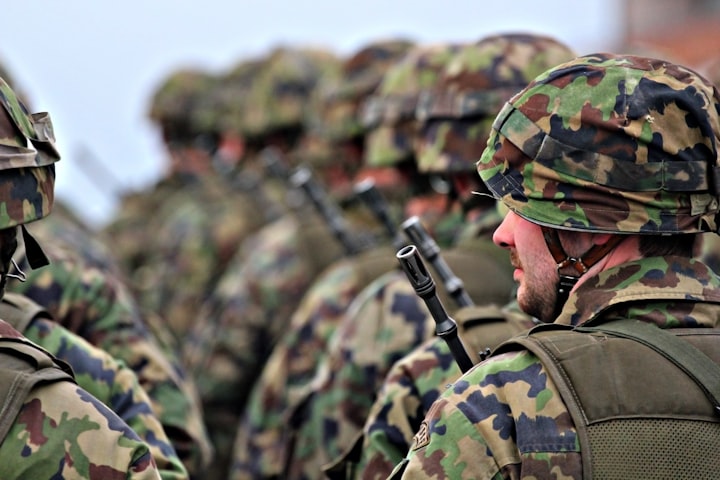This Memorial Day, Let’s Talk Skin Cancer In The Military
James Goydos shares insights discussing skin cancer in the military. Although more silent than the threat of a missile, the threat of sun exposure is a real one. Learn about skin cancer in the military with James Goydos MD, board certified surgeon and expert in melanoma and soft tissues tumors.

This article was previously authored by Dr. James Goydos and published on Tealfeed June 2021
Memorial Day has an important place in American history. It is the one day of the year which is set aside for our nation to memorialize those who have lost their lives in the performance of their military duties. It was first celebrated in 1868, then known as ‘Decoration Day’, and has become a prominent fixture in American culture to this day. While it has become synonymous for many with weekend sales and an unofficial start to Summer, the meaning behind the holiday is to remember those who have lost their lives in their service to the United States.
Warfare and cancer have both claimed millions of lives
Warfare has claimed over a million lives throughout American history, and the numbers continue to climb as American military continues to have military presence in war-torn regions. It is no secret that combat has contributed to countless deaths across the globe, across cultures and creeds. But deaths during combat are not the only unifying source of mortality around the world.
What might you ask renders global citizens vulnerable? You may say the coronavirus pandemic. And you would be right. However, cancer also poses a risk of death for many around the world. In fact, research estimates that preventable cancer deaths may be on the rise during the COVID-19 pandemic, due in part to a decrease in cancer screening and diagnosis.
Skin cancer is one of the most preventable types of cancer
“Skin cancer is the most common type of cancer affecting humans and is one of the most preventable types of cancer through education and public awareness.” – James Goydos, M.D., F.A.C.S.
One such example of an often-preventable type of cancer is skin cancer. Educating individuals on the dynamics of skin cancer is one of the most powerful ways we can help to prevent skin cancer. UV exposure, for example, is a proven human carcinogen, and understanding how to prevent unnecessary exposure can help safeguard the skin.
When we think of wounds and casualties in the military, many may think only of death during combat. But cancers impact the armed forces, too, and skin cancer is no exception. Although more silent than the threat of a missile, the threat of sun exposure is a real one.
Research illustrates that members of the armed forces are at a disproportionate risk of developing skin cancers due, in part, to increased exposure to harmful UV radiation from the sun. The incidence of harmful exposure can vary depending upon the branch of the armed forces; however, the potential risk is one which should be accounted for.
Comprehensive studies on the unique exposure risk posed to members of different branches have yet to be conducted. However, research to date shows that the risk of melanoma does seem branch dependent. The highest rates of melanoma have been found in the United States Air Force, and melanoma is the second most common cancer in males in the U.S. Navy.
Anyone who spends extended amounts of time outdoors, whether in outdoor occupations or in service to their nation, is at an increased risk of developing skin cancer. Learning how to mitigate that risk is essential.
Mitigating the risk of melanoma and other forms of skin cancer
One of the easiest ways to reduce the risk of developing skin cancer is to practice safe sun. Limit unnecessary UV exposure as a first port of call. This includes limiting exposure to the sun, as well as artificial sources of UV radiation from tanning beds. Cancer doesn’t care if the UV source is real or artificial.
Mitigating your risk also means protecting your skin with sunscreen, UV protective clothing and sunglasses, and seeking shade when outdoors. Avoiding being outdoors during times of peak UV index is also recommended.
Recognizing the signs of skin cancer
Conducting regular skin checks is another important factor in reducing risk. Not all skin cancers may be preventable, but you can increase your chances of early detection with frequent skin checks. Every month, check yourself head to toe with a full-length mirror.
Familiarize yourself with the ABCDE’s of melanoma, the signs of Basal Cell Carcinoma, and note any changes month to month. Bring your notes with you to your next doctor’s appointment, and be sure to get any suspicious moles checked up, even if it hasn’t been a year since your last check-in.
There are many different types of skin cancer, so be sure to talk to your doctor about your health needs and which may pose the greatest risk to your health. If you are a veteran, active duty military, or are in an occupation which may increase your sun exposure, consider frequent skin checks to be a part of your self-care routine. They may just save your life.
About Dr. James Goydos
Dr. James Goydos is an expert in melanoma research and specialist in surgical oncology with an M.D. from Rutgers University. With over 20 years of experience as a Professor, Surgeon, and Clinical Trial Lead, he is a leading expert in his field.
Subscribe to James Goydos’ newsletter. Follow me on Good Men Project, Newsbreak, Hubpages, Loop, Medium, Instagram, Facebook,YouTube, Medika Life, Doximity, Github, Kaggle, Vocal, LinkedIn
About the Creator
James Goydos, MD
James Goydos MD - Doctor, surgeon & expert on skin cancer. M.D. from Rutgers. Experience as a Professor of Surgery, Surgical Oncologist, & clinical trial leader. Writing on cancer, detction with camera / computer vision and healthcare.






Comments
There are no comments for this story
Be the first to respond and start the conversation.